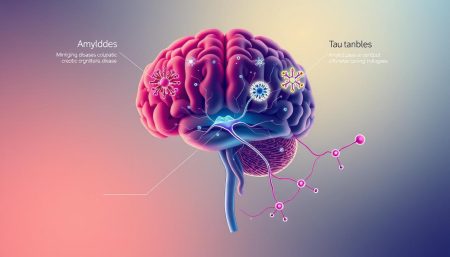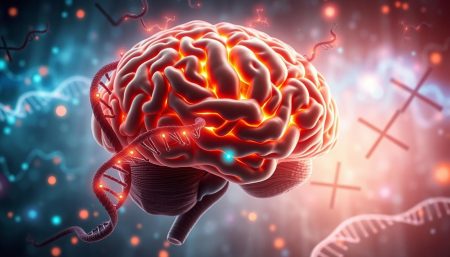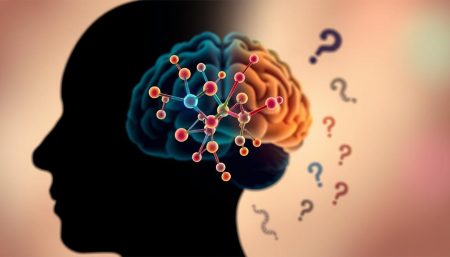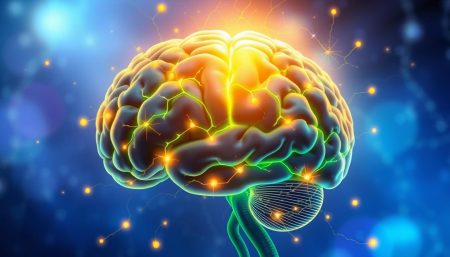The journey to understand Alzheimer’s disease starts with facing the reality of a progressive neurological disorder. It affects the minds of millions. At its heart, it brings memory loss and cognitive decline that never stops.
Knowing the causes of Alzheimer’s and the early signs is crucial. This knowledge helps in scientific research and supporting those on this tough path. It turns information into hope for patients and their families.
Key Takeaways
- Insight into what is Alzheimer’s disease, a condition marked by progressive brain change.
- Significance of identifying causes of Alzheimer’s for early intervention.
- Recognizing the early signs of Alzheimer’s to support timely diagnosis and care.
- Understanding Alzheimer’s as a progressive neurological disorder integral to developing management strategies.
- Highlighting the impact of Alzheimer’s on cognitive decline and daily living.
Understanding Alzheimer’s Disease
Alzheimer’s disease is a chronic neurodegenerative disease that affects brain health and causes cognitive impairment. This section will explore how Alzheimer’s changes brain function and its effects on those who have it.
Understanding Alzheimer’s means seeing how it starts with small memory problems and grows into severe cognitive decline. It affects daily life activities a lot. Researchers say it’s because of abnormal proteins in the brain that harm neurons, leading to memory loss and dementia symptoms.
Early signs of Alzheimer’s and brain health decline are key. Knowing about the disease helps in managing and caring for it. This can slow down its progress with timely actions and brain health plans.
Early diagnosis and ongoing care help understand Alzheimer’s better. This helps families and caregivers plan and deal with the disease. Here’s how to manage Alzheimer’s well:
- Educate on the disease’s progression and impact on cognitive abilities.
- Regular consultations and check-ups with neurologists.
- Engagement in mental exercises and activities that foster cognitive function.
- Adoption of lifestyle modifications that support overall brain health.
In conclusion, understanding Alzheimer’s as a chronic neurodegenerative disease helps those affected and their families manage its effects. With education, early diagnosis, and comprehensive care, we can better manage this disease.
What Is Alzheimer’s Disease
Alzheimer’s disease is a big challenge in the world of brain disorders. It causes the brain to slowly break down, affecting how we think and live. We will explore how Alzheimer’s changes the brain and what makes it different from other dementias.
The Biological Impact on the Brain
Alzheimer’s disease makes the brain work less well. It harms memory, thinking, and how we solve problems. The disease creates harmful clumps in the brain, leading to brain tissue loss and fewer brain cells.
This damage makes it hard for people to do things on their own. It’s a big part of why Alzheimer’s is so tough to deal with.
Comparing Alzheimer’s Disease with Dementia
It’s important to know the difference between dementia and Alzheimer’s. Alzheimer’s is a type of dementia caused by specific brain changes. These changes include harmful clumps and tangles that hurt brain cells.
Not all dementia is caused by Alzheimer’s. This means there are different types of dementia, each with its own causes and effects. Knowing this helps us understand and treat each condition better.
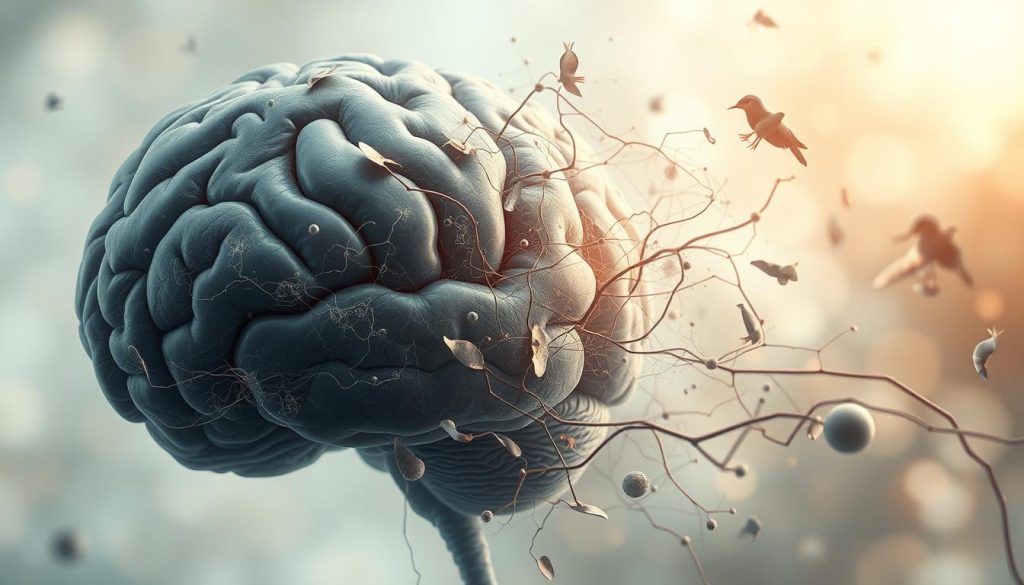
Learning about Alzheimer’s helps us find better ways to care for people with the disease. It also helps us find new treatments. By studying Alzheimer’s, we can make life better for those affected.
Exploring the Causes of Alzheimer’s
Alzheimer’s disease has a complex cause. At the heart of it are amyloid plaques, neurofibrillary tangles, and the damage to brain cells. These elements are key to understanding how the disease starts and grows. They begin with small changes in the body and end with big problems with thinking.
| Biological Marker | Description | Impact on Brain Cells |
|---|---|---|
| Amyloid Plaques | Protein fragments that accumulate between nerve cells. | Block neuronal signaling and contribute to cell death. |
| Neurofibrillary Tangles | Twisted fibers of tau protein found within brain cells. | Disrupt transport of nutrients and essential molecules, leading to cell dysfunction and death. |
Studies show that these plaques and tangles start forming years before symptoms show up. This means there might be a chance to stop the disease early. Scientists are still trying to figure out why they form. They think it could be because of genes, the environment, and how we live.
Looking into how these markers affect brain cells could lead to new ways to find and treat Alzheimer’s early. But, it’s hard to tell the difference between normal aging and Alzheimer’s. This makes it tough to catch the disease early and treat it right away.
- Increased understanding of amyloid plaques’ genesis and its prevention.
- Research on neurofibrillary tangle formation and its molecular inhibitors.
- Strategies to protect brain cells from early degeneration.
Scientists are working hard to solve this puzzle. They want to stop Alzheimer’s before it starts. Their work gives us hope for better treatments and care in the future.
Genetics and Alzheimer’s Risk Factors
Genetics play a big role in Alzheimer’s disease. They link to family history and individual genes. Knowing about Alzheimer’s genetics helps us understand Alzheimer’s risk factors and how to intervene.
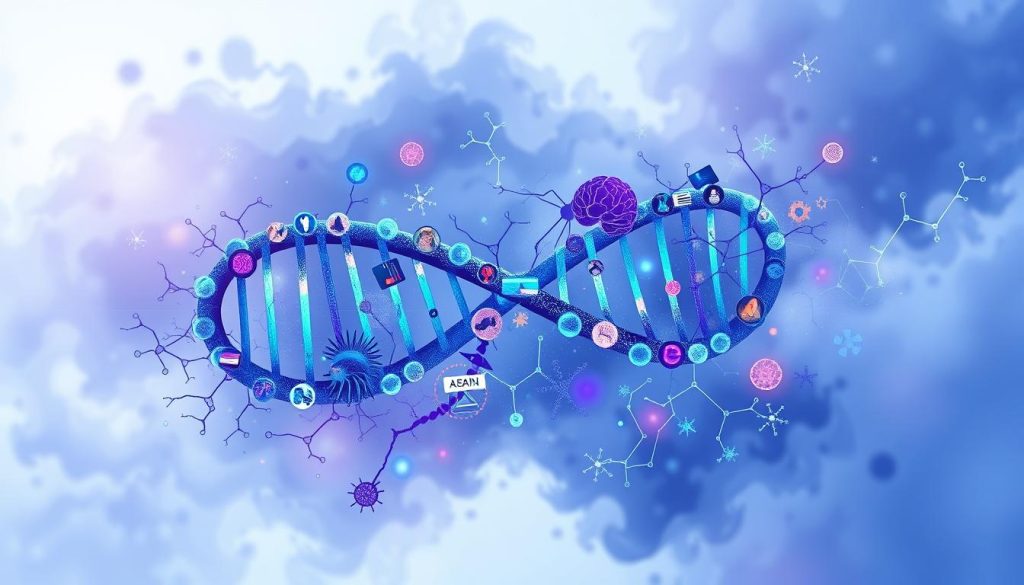
The Role of Family History
Family history is a key sign of genetic predisposition to Alzheimer’s. If a close relative has Alzheimer’s, you’re more likely to get it too. This shows the impact of familial Alzheimer’s and shared lifestyle and environment.
Genetic Mutations and Alzheimer’s
Some genetic mutations are linked to hereditary Alzheimer’s. These mutations raise your risk of getting the disease. Genetic testing is something many consider. A detailed fact sheet from here explains how these mutations work with other risk factors.
| Gene | Impact on Risk |
|---|---|
| APOE-e4 | Increases risk, notable impact on age of onset |
| APP | Associated with familial early-onset Alzheimer’s |
| Presenilin-1 (PSEN1) | Linked to early-onset Alzheimer’s |
| Presenilin-2 (PSEN2) | Rarer, but associated with Alzheimer’s disease |
Genetics and Alzheimer’s are closely connected. This is why some families get Alzheimer’s more often. Genetic research is key to finding ways to prevent and treat it. As science advances, we learn more about Alzheimer’s risk factors. This brings hope for better treatments and outcomes in the future.
Lifestyle: How It Affects Alzheimer’s
Looking into how lifestyle affects Alzheimer’s prevention shows us important things. Eating right and staying active are key to keeping our brains sharp and our bodies healthy.
Diet and Brain Health
Eating well is crucial for fighting Alzheimer’s. Foods full of antioxidants, healthy fats, vitamins, and minerals help our brains work better. They also fight off inflammation, which is bad for our brains.
We should eat more fruits, veggies, whole grains, and fatty fish. These foods are great for our brain health.
Exercise and Cognitive Function
Exercise and Alzheimer’s are linked. Working out keeps blood flowing to our brains, which is good for thinking. Walking, yoga, and strength training can improve memory and thinking skills.
| Component | Benefits | Examples |
|---|---|---|
| Diet | Supports brain function, reduces inflammation | Leafy greens, berries, nuts |
| Exercise | Increases blood flow, enhances cognitive functions | Swimming, brisk walking, tai chi |
By making these lifestyle changes, we can prevent Alzheimer’s and improve our health. It shows how important it is to take care of ourselves in every way.
The Early Signs of Alzheimer’s Disease
Spotting the early signs of Alzheimer’s is key to getting help early. Knowing these symptoms helps us understand the first changes of the disease.
Memory Loss and Confusion
Memory impairment is a clear sign of Alzheimer’s. It shows as trouble remembering recent things or talks. People might get confused, even in places they know well. This can upset both the person and their loved ones.
Behavioral Changes in Early Stages
Behavioral signs are just as important. Early on, people might seem moody, irritable, or not care about things. These changes can make it hard for them to connect with others and feel good emotionally.
Knowing these signs helps in diagnosing Alzheimer’s early. It also helps families and caregivers give the right support. They can use strategies that match the person’s cognitive and behavioral changes.
Recognizing Alzheimer’s Symptoms
Spotting Alzheimer’s symptoms early is key. It opens doors to treatments and planning. This part will cover common signs of Alzheimer’s. Knowing these signs is the first step to getting a diagnosis and managing the disease.
Alzheimer’s symptoms vary and can mix together. Here’s a list to help spot warning signs:
- Memory loss that disrupts daily life – forgetting new info or important dates.
- Challenges in planning or solving problems – trouble making plans or working with numbers.
- Difficulty completing familiar tasks – like driving or managing money, which was easy before.
- Confusion with time or place – losing track of dates, seasons, and time.
- Trouble understanding visual images and spatial relationships – reading or judging distance becomes hard.
- New problems with words in speaking or writing – finding the right word or naming things correctly.
- Misplacing things and losing the ability to retrace steps – putting things in odd places or losing them.
- Decreased or poor judgment – making bad money choices or neglecting personal care.
- Withdrawal from work or social activities – stepping back from hobbies, social events, or work.
- Changes in mood and personality – becoming confused, suspicious, depressed, fearful, or anxious.
It’s vital to recognize these symptoms for a timely diagnosis. If you see several signs, talk to a doctor. They can discuss your symptoms and start tests.
| Symptom | Possible Indications |
|---|---|
| Memory loss that disrupts daily activities | Early sign of Alzheimer’s, often noticed by family. |
| Difficulty completing familiar tasks | Potential decline in cognitive functions for task management. |
| Confusion with time or place | Loss of understanding about time, dates, and sometimes, displacement. |
| New problems with words in speaking or writing | Could signal deteriorating language skills, common in Alzheimer’s progression. |
| Misplacing things and losing the ability to retrace steps | Indicative of decreased problem-solving skills and memory. |
Progression of Alzheimer’s Stages
It’s important to know how Alzheimer’s progresses through its stages. This helps those affected understand the changes they go through. We’ll look at how symptoms start and get worse, showing how the mind declines.
Mild Alzheimer’s: Early-Stage Symptoms
In the early stages, people might forget recent things or conversations. They might also struggle to find words or plan. These are signs of Alzheimer’s starting to show.
Moderate Alzheimer’s: Mid-Stage Symptoms
When Alzheimer’s gets worse, it’s clear in how people think and do things. They might get confused, forget important parts of their life, and have trouble speaking or doing complex tasks.
Severe Alzheimer’s: Late-Stage Symptoms
In the late stages, people may not talk clearly or recognize family. They might also lose physical skills, needing a lot of help every day.
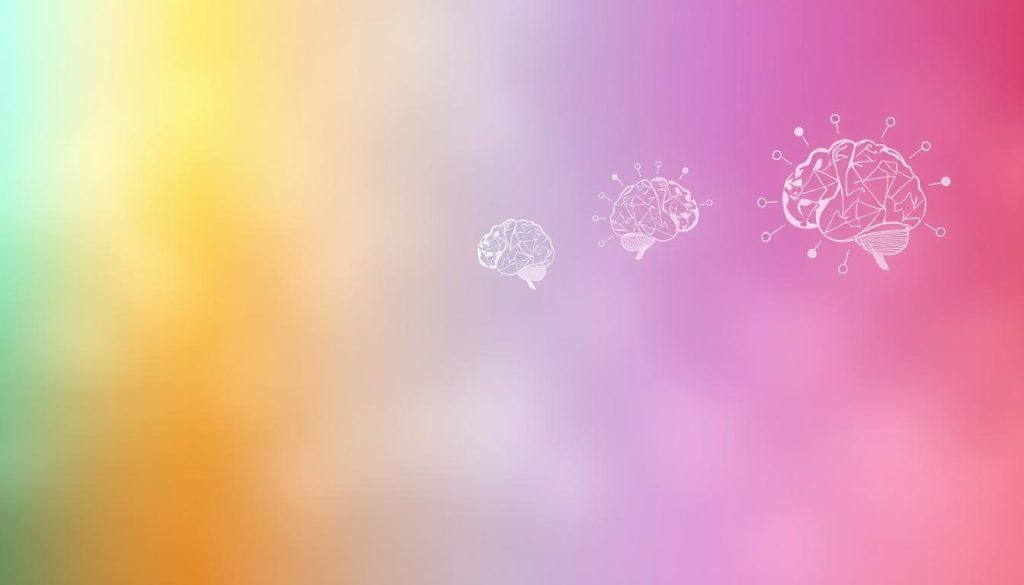
| Stage | Symptoms | Impact on Daily Life |
|---|---|---|
| Mild | Memory lapses, difficulty with problem-solving | Moderate impact, can manage personal care with minimal assistance |
| Moderate | Increased confusion, emotional unpredictability, significant memory gaps | Significant impact, requires assistance with personal care and daily activities |
| Severe | Loss of awareness of environment and relationships, severe cognitive disability | Full-time care necessary, major impact on all activities of daily living |
Diagnosis of Alzheimer’s Disease
Diagnosing Alzheimer’s disease involves a detailed process. It combines clinical checks with advanced imaging technologies. This method ensures a quick and accurate diagnosis, crucial for managing the disease.
Cognitive Tests and Assessments
Cognitive tests are key in diagnosing Alzheimer’s. Doctors use various tests to check memory, problem-solving, and language skills. The Mini-Mental State Examination (MMSE) and Alzheimer’s Disease Assessment Scale-Cognitive Subscale (ADAS-Cog) are common tools. They help spot the cognitive decline seen in Alzheimer’s.
Medical Imaging in Alzheimer’s Diagnosis
Medical imaging, like MRI and PET scans, is vital for diagnosis. MRI scans show the brain’s structure, helping to rule out other conditions. PET scans look at brain activity and plaque buildup. These tools help confirm Alzheimer’s and track its progress.
| Imaging Technique | Primary Use | Benefits in Alzheimer’s Diagnosis |
|---|---|---|
| MRI | Structural Imaging | Detects brain shrinkage and structural abnormalities |
| PET scan | Metabolic Imaging | Identifies areas of reduced brain activity and abnormal protein deposits |
Current Alzheimer’s Treatments and Therapies
There are many ways to fight Alzheimer’s disease. We have Alzheimer’s medications and different therapies. These help keep people’s lives as good as they can be.
Medications to Manage Symptoms
Medicines are key in fighting Alzheimer’s. They help slow the disease and manage symptoms. Cholinesterase inhibitors and memantine are two types. They make brain messages clearer.
Donepezil, Rivastigmine, and Galantamine are common. They help people with early to middle-stage Alzheimer’s.
Non-Medical Interventions and Support
There’s more to fighting Alzheimer’s than just medicine. Cognitive behavioral therapy and occupational therapy are important. They help with daily life and managing symptoms.
Cognitive therapy keeps the mind sharp with exercises. Occupational therapy makes homes safer and easier to live in.

Changing your lifestyle is also key. Eating well, staying active, and staying connected are important. They help keep the mind strong and the body healthy.
In short, fighting Alzheimer’s needs a mix of medicines, therapies, and support. This way, we can manage symptoms and keep quality of life high for patients.
Preventive Measures Against Alzheimer’s
In the fight against Alzheimer’s disease, Alzheimer’s prevention strategies are key. By focusing on cognitive reserve, mental health, and lifestyle changes, we can lower the risk. This part explores ways to strengthen the brain against Alzheimer’s.
Building cognitive reserve is crucial for fighting Alzheimer’s. Cognitive reserve is the brain’s ability to resist damage. The more reserve you have, the longer you can delay Alzheimer’s symptoms, even if the disease is there. Reading, solving puzzles, and staying socially active can help build this reserve.
Mental health is also closely tied to Alzheimer’s. Managing stress, treating depression, and keeping strong social ties are essential. These steps improve life quality and help prevent Alzheimer’s by reducing risk factors.
- Regular physical exercise to stimulate brain activity
- Nutrition rich in omega-3 fatty acids, antioxidants, and vitamins
- Mindfulness and meditation to reduce stress and anxiety
- Sleep hygiene practices to ensure adequate, quality sleep
These lifestyle changes boost overall health and specifically help against Alzheimer’s and other brain diseases. Making these changes now can greatly benefit your future, offering a strong, resilient brain.
Starting healthy brain habits early is vital for mental health and stability later on. It highlights the importance of Alzheimer’s prevention strategies.
Living with Alzheimer’s: Management and Care
Living with Alzheimer’s changes everything. Families and caregivers create detailed plans to help their loved ones. These plans include strategies and changes to daily life.
Adapting to Daily Life Challenges
Making homes safe is key. Simple changes like labeling and securing items help a lot. Automated lights also make homes safer for those with Alzheimer’s.
- Label household items and appliances clearly.
- Install safety locks on cabinets containing harmful products.
- Arrange furniture to create clear walking paths.
Strategies for Alzheimer’s Caregiving
A good care plan includes scheduling and medical checks. It also focuses on emotional support. Caregivers need to manage appointments and talk to doctors regularly.
| Care Aspect | Strategy Description | Expected Outcome |
|---|---|---|
| Medical Management | Regular consultations and adapting treatment plans as needed. | Stabilize symptoms and control progression. |
| Physical Activity | Incorporate simple exercises tailored to ability. | Enhance mobility and reduce cognitive decline. |
| Emotional Support | Regular meetings with therapists or support groups. | Alleviate stress and improve mental health. |
Strong support networks and access to respite care are also vital components of an effective Alzheimer’s care plan, essential for long-term sustainability in caregiving.

Alzheimer’s Caregiving: Supporting Loved Ones
Being a caregiver for someone with Alzheimer’s is a loving but tough journey. It needs patience, skill, and a strong support network. Good communication and support are key to handling caregiving’s challenges and stress.
Communication Tips for Caregivers
Effective Alzheimer’s caregiving starts with great communication. Talking clearly and empathetically with your loved one can reduce confusion and bring comfort. Here are some tips to improve communication:
- Speak in simple, short sentences.
- Keep eye contact to help focus and reassure.
- Use a calm, soothing voice to show empathy and care.
- Avoid arguments and gently steer conversations if they get upset.
- Use nonverbal cues like smiles or pats to support your words.
Building a Support Network for Caregivers
Creating a caregiver support network is crucial. It offers both practical help and emotional support. Here’s how to build a strong support system:
- Join local Alzheimer’s caregivers support groups to share and learn.
- Look for respite services to take a break, which is key for managing stress.
- Use social media or online forums to connect with other caregivers worldwide.
- Consider professional counseling or therapy for emotional or mental health issues.
- Involve family and friends in caregiving to share duties and prevent burnout.
By following these tips, you can change your caregiving experience from just surviving to truly thriving. This ensures you and your loved one get the care and compassion you need.
Conclusion
We’ve explored Alzheimer’s disease deeply, looking at its biology, genetics, and lifestyle links. Understanding this is key for better care and support for those with Alzheimer’s. It helps families make informed choices and cope with the disease.
Community support is vital in building a strong network of help and understanding. It brings hope and resources to those affected.
Coping with Alzheimer’s goes beyond just medical treatment. It includes daily care, communication, and caring practices. By combining medical wisdom and caregiver support, we create a caring environment. This environment values the dignity of each person’s journey.
We are dedicated to educating and supporting those with Alzheimer’s. Our goal is to help understand and support the disease. We aim to improve quality of life and offer community support.
Let’s keep supporting each other through the challenges of Alzheimer’s. Every story of courage and care strengthens our support system.
FAQ
Q: What is Alzheimer’s disease?
A: Alzheimer’s disease is a brain disorder that causes memory loss and thinking problems. It makes it hard to do everyday tasks. It’s the main cause of dementia in older adults and gets worse over time.
Q: What causes Alzheimer’s?
A: We don’t know all the causes of Alzheimer’s. But it’s thought to be a mix of genetics, environment, and lifestyle. Changes in the brain, like amyloid plaques and lost connections, play a big role.
Q: What are the early signs of Alzheimer’s?
A: Early signs include memory loss and trouble with planning. You might struggle with familiar tasks or get confused about time and place. Other signs are problems with words, losing things, and changes in mood and personality.
Q: How does Alzheimer’s differ from other forms of dementia?
A: Alzheimer’s is a specific type of dementia with certain symptoms and brain changes. Dementia is a broader term for mental decline that affects daily life. Other dementias, like vascular dementia, have different symptoms and causes.
Q: What are the risk factors for Alzheimer’s?
A: Risk factors include age, family history, and genetics. Cardiovascular disease, head trauma, and lifestyle choices like diet and exercise also play a part. Some risks, like genetics, can’t be changed, but lifestyle choices can.
Q: Are there preventive measures for Alzheimer’s?
A: There’s no sure way to prevent Alzheimer’s. But, a healthy diet, exercise, social activity, and brain challenges might help. Managing heart disease risk factors is also important.
Q: How is Alzheimer’s diagnosed?
A: Diagnosis involves medical history, cognitive tests, and imaging like MRI or PET scans. Early and accurate diagnosis helps in managing the disease and planning for the future.
Q: What are the treatment options for Alzheimer’s?
A: Treatments aim to manage symptoms. They include medications and non-medical interventions like cognitive stimulation. A personalized treatment plan can improve quality of life.
Q: What strategies can help in caregiving for someone with Alzheimer’s?
A: Strategies include creating a safe environment and keeping a routine. Use simple communication and manage behavioral symptoms with patience. Seek support and take care of your own health.
Q: How can caregivers cope with the stress of caring for someone with Alzheimer’s?
A: Caregivers can find support from family, friends, or groups. Use respite care and take breaks. Practice stress-reduction techniques and consider counseling if needed.












